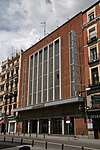Teatro Variedades
1847 establishments in SpainEntertainment venues in MadridFormer theatres in MadridOpera structure stubsTheatres completed in 1847 ... and 1 more
Theatres in Spain

The Teatro Variedades was a famous Colosseum in the city of Madrid, Spain, in the 19th century. Erected in 1847, the theater was located at 40 Magdalena Street. It was known once as one of the most entertaining theatres for the not-so-demanding general public. There, the Boufee genre, the political revue and other minor theatrical genres were inventively exploited. The theater was consumed by flames in a fire on 29 January 1888, resulting in its demolition because of its wooden foundations.
Excerpt from the Wikipedia article Teatro Variedades (License: CC BY-SA 3.0, Authors, Images).Teatro Variedades
Calle de la Magdalena, Madrid
Geographical coordinates (GPS) Address Phone number Website Nearby Places Show on map
Geographical coordinates (GPS)
| Latitude | Longitude |
|---|---|
| N 40.4123 ° | E -3.6999 ° |
Address
Pelucas Cabello R.
Calle de la Magdalena 36
28012 Madrid (Centro)
Community of Madrid, Spain
Open on Google Maps










